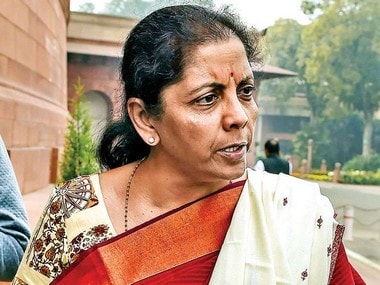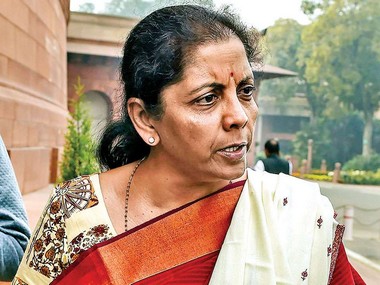After the announcement of the foreign direct investment, in a major reform measure, the Central government on Friday amalgamated 10 public sector banks (PSBs) into four entities, bringing down their total number to 12 from 27 in 2017, a move aimed at making state-owned lenders global sized banks. Big banks enhanced capacity to increase credit, Finance Minister Nirmala Sitharaman said at the start of the press conference before announcement of the new bank mergers. In place of fragmented lending capacity with 27 PSBs in 2017, now there will be only 12 state-run banks post-consolidation, Sitharaman said. The finance minister also said banks will be provided adequate capital. Canara Bank to be merged with Syndicate Bank to create 4th largest public sector bank with Rs 15.20 lakh crore business. Union Bank, Andhra Bank, Corporation Bank to merge to become India’s 5th largest public sector bank with Rs 14.59 lakh cr business: [caption id=“attachment_6984531” align=“aligncentre” width=“380”]  File image of Union Finance Minister Nirmala Sitharaman. PTI[/caption] According to Finance Minister Nirmala Sitharaman, Orient Bank of Commerce and United Bank of India will be merged with Punjab National Bank. Bank of India, Central The Indian Bank will be merged with Allahabad Bank. Oriental Bank and United Bank will be merged with Punjab National Bank thus becoming the second-largest bank after the merger.
Here is the list of 10 public sector banks which merged into four as announced by FM Nirmala Sitharaman
| Anchor bank | Amalgamating bank (s) | Business size (Rs lakh cr) | PSB rank by size |
|---|---|---|---|
| PNB | Oriental Bank of Commerce | 17.94 | 2nd largest |
| United Bank of India | |||
| Canara Bank | Syndicate Bank | 15.20 | 4th largest |
| Union Bank of India | Andhra Bank | 14.59 | 5th largest |
| Corporation Bank | |||
| Indian Bank | Allahabad Bank | 8.08 | 7th largest |
Indian Bank and Allahabad Bank to merge to create 7th largest public sector bank with Rs 8.08 lakh cr business, the Finance Minister said.
In place of fragmented lending capacity with 27 PSBs in 2017, now 12 #PSBs post consolidation. बड़े बैंक अब अपना लक्ष्य रखेंगे global मार्केट पर, मँझले बैंक बनेंगे राष्ट्रीय स्तर के और कुछ बैंक स्थानीय नेतृत्व करेंगे। @PMOIndia @FinMinIndia @PIB_India #PSBsFor5TrillionEconomy pic.twitter.com/Z4dcyZOG5f
— Rajiv kumar (@rajivkumarec) August 30, 2019
Bank boards have been given flexibility to fix sitting fee of independent directors. Public sector banks enabled to do succession planning, she said unveiling governance reforms in PSBs.
Consolidated Indian & Allahabad Banks to be 7th largest #PSB with ₹ 8.08 lakh cr. business. Strong scale benefits to both with business doubling. High CASA & lending capacity combined in consolidated bank. @PMOIndia @FinMinIndia @PIB_India #PSBsFor5TrillionEconomy pic.twitter.com/fRercARJIU
— Rajiv kumar (@rajivkumarec) August 30, 2019
Sitharaman also announced tentative amounts of capital infusion in 10 public sector banks.
Finance Minister Nirmala Sitharaman: Specialised agencies have been set up who are monitoring every loan which is over Rs 250 crores. pic.twitter.com/zwvwSMfcHn
— ANI (@ANI) August 30, 2019
PNB will get approximately Rs 16,000 crore. Union Bank of India will get Rs 11,700 crore, followed by Bank of Baroda Rs 7,000 cr; Canara Bank Rs 6,500 crore, Indian Bank Rs 2,500 crore. While Indian Overseas Bank will get Rs 3,800 crore, Central Bank of India will get Rs 3,300 crore and UCO Bank Rs 2,100 crore. United Bank of India will get approximately Rs 1,600 crore and Punjab and Sind Bank Rs 750 crore. Together these banks will get approximately Rs 55,250 crore. Capital infusion for PSBs Last week, Sitharaman had announced that the Rs 70,000 crore capital infusion for PSBs for the current fiscal would be front-loaded.  Financial Services Secretary Rajiv Kumar, who was also present at the press conference, said there was no retrenchment in the past consolidations, including of SBI, and service conditions of employees improved. “Employees will only benefit with the mergers,” he added. Earlier this year, Dena Bank and Vijaya Bank were merged with Bank of Baroda. Prior to this, the government had merged five associate banks of SBI and Bharatiya Mahila Bank with the State Bank of India. Indian Overseas Bank, UCO Bank, Bank of Maharashtra and Punjab and Sind Bank will continue to function as earlier as they have strong “regional focus”, Sitharaman added. Read Live Blog here: Nirmala Sitharaman Press Conference LIVE Updates With inputs from agencies


)
)
)
)
)
)
)
)
)



